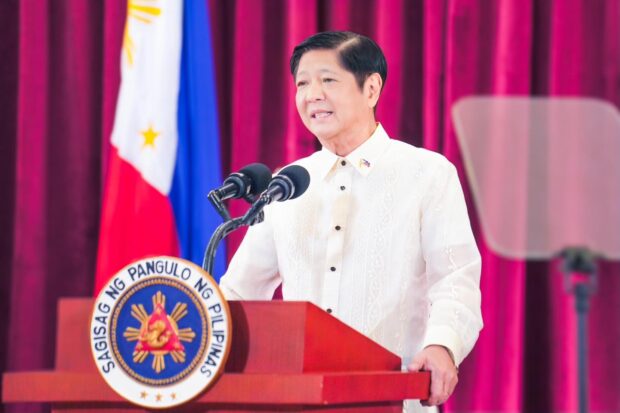Amnesty for ex-rebels ‘significant steps toward national healing’

President Ferdinand Marcos Jr. | PHOTO: PCO Official facebook page
MANILA, Philippines — President Ferdinand Marcos Jr.’s move to grant amnesty to former communist and secessionist rebels are “crucial, pivotal steps” for healing, peace, and economic and social development.
This was how the president and Speaker Martin Romualdez defended the amnesty proclamations amid skepticism from Makabayan lawmakers about the government’s sincerity in wanting peace.
In a speech before the Philippine Army’s First Scout Ranger Regiment in Camp Pablo Tecson in San Miguel, Bulacan, Mr. Marcos called the pursuit of peace a “pressing national concern.”
“The amnesty proclamations issued under Executive Order No. 47 signify significant steps toward national healing and toward peacebuilding,” the president said.
Romualdez, a cousin of the president, backed the amnesty grants extended to former communist rebels and ex-members of the Moro National Liberation Front and Moro Islamic Liberation Front.
Article continues after this advertisement‘Confidence-building measure’
The Speaker cited the “intrinsic link between peace and national development” in the peace initiatives that began during former President Rodrigo Duterte’s term and “zealously continued” by Marcos.
Article continues after this advertisementIloilo Rep. Raul Tupas, chair of the House national defense committee, said the amnesty proclamations were a “confidence-building measure” that may help restart the peace negotiations with communist rebels.
Tupas also called on the Department of Justice and the Office of the Presidential Adviser on Peace, Reconciliation and Unity to inform Congress and the public on how many pending cases, persons deprived of liberty, and families will be affected by the amnesty.
Cristina Palabay, secretary general of the human rights group Karapatan, said the amnesty program of the Marcos administration would only “oblige” or “force” grantees under the program to admit membership to the Communist Party of the Philippines, its armed wing New People’s Army and political wing, the National Democratic Front of the Philippines.
She pointed out that grantees may even be “forced” to admit to committing a “number of antigovernment actions” that may even include activities that do not even involve the use of arms.
The amnesty, however, does not include coverage of crimes such as terrorism, kidnap-for-ransom, massacre, rape, crimes against chastity, drug-related charges, torture, grave violations of the Geneva Convention of 1949, genocide and war crimes.